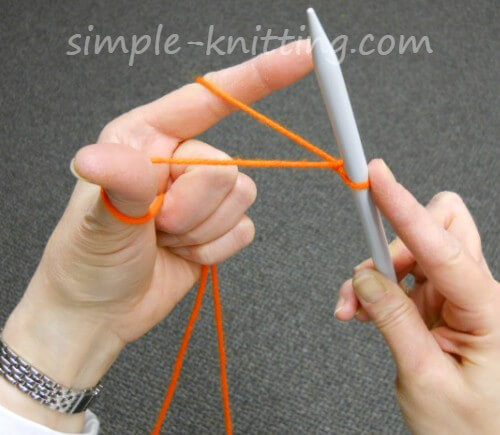
There are many ways to learn to knit. There are many options for learning how to knit. You can use an online community, a friend, family member or tutor, or a beginner kit. To find the best method for you, experiment.
Beginner kits
An excellent way to learn knitting is to get a beginner kit. These kits include yarn, needles, a pattern, and often include yarn. Other knitting notions are often included in these kits. Knitting kits can be used to make everything, from large blankets and mittens.

Online communities
If you're looking for a community of knitters, there are several online options. A forum is one of these options. You can share your knitting tips and tricks with other knitters. A second option is to join a knitting class in person. If you have a full time job, children, or are suffering from chronic illness, it can be difficult to join in-person knitting groups.
Tutors
Beginning knitters need tutors to help them learn the craft. Lessons should not exceed 45 minutes. Once the student masters the basic skills, they will be able to knit independently. Be patient with your students, tutors. Children tend to pick up things faster than adults.
Refer a friend or family member
Most people who are good at knitting will enjoy teaching others how they do it. There are likely to be someone in your life who can teach you how to knit, regardless of whether you are just starting out or an expert. However, you might not be as experienced as the person teaching you, and you won't get as much personalized instruction from them as you'll get from a teacher.

Online classes
There are many different ways to learn how knit. Online classes are a great way to learn how to knit a scarf and a sweater. Some offer personalized instruction that you can start at your own pace. Some classes can also be found in person, but you may be more inclined to learn online.
FAQ
How do I find a hobby that interests me?
It can feel overwhelming to start your search for a hobby when you first begin.
You may be thinking, "I'm just not artistic" or "I hate sports," or perhaps "I don’t even know what I know."
However, it is likely that you already have a lot to draw on when searching for a hobby.
It's just that you haven't realized it yet.
Take a tour of your house. How much stuff are you able to store?
Are there any toys that you don't use anymore?
Perhaps you have a collection books or magazines.
Perhaps cooking has been something you've wanted to do all your life.
Maybe you want to get back into playing the guitar.
Whatever your hobby, it's possible to make it a hobby.
The key is to realize that you already have plenty of experiences to draw upon.
And once you do, you'll be able to pick out a hobby that fits right into your lifestyle.
Why do we need hobbies
Hobbies are an important part of our lives because they give us time to relax, unwind, think creatively, exercise, socialize and enjoy ourselves. Hobbies offer opportunities to develop new skills as well as life-long interests.
Hobbies allow us to find meaning in our lives.
These can often be a great way to get some extra time while you have nothing else.
And they're fun!
If you don't have time for a hobby, then you probably don't have time for anything else either.
Consider all of the possibilities available to your. If you don't have a hobby yet, then maybe you should start one today!
How do you get started with your new hobby or interest?
It is important to choose the type of hobby you want to start.
After you've decided on your subject, it is important to feel passionate about it.
It is important to know the reason you want to begin a hobby. This will help you to find your purpose and direction.
Once you've chosen the hobby you would like to pursue you can start planning.
Think about the equipment that will be needed.
You should consider whether or not you will need to take classes or attend seminars.
Ensure that you have enough space for your hobby.
Consider joining a club, or group. These groups are often supportive and offer advice.
Think about how much you'd need to spend on your hobby.
Statistics
- 37% Video Games 36% Travel 36% Health and Fitness (quizexpo.com)
- Studies show that just six minutes of reading can reduce stress levels by 60 percent. (oberlo.com)
- This 100% accurate personality-analyzing hobby quiz discovers your passion based on your characteristics. (quizexpo.com)
- In comparison, men in the “no humor” condition were refused 84.6% of the time and were only accepted 15.4% of the time. (time.com)
- Almost 80% of people claim to have no hobby. (hobbylark.com)
External Links
How To
How to learn a musical Instrument
There are many ways you can learn to play music. You have the option of going to school, buying a book or taking lessons from someone who plays an instrument. Or, you can watch videos online. Here are some tricks and tips to help you find your way.
-
Find something that interests you. Try another instrument if you don't love any of the ones you see. It's difficult to take up a hobby if you don’t love playing the instrument.
-
Be patient. Learning anything new takes time. It is unrealistic to expect to know everything instantly. Instead, practice every day.
-
Make sure you practice regularly. Even when you feel tired, continue practicing. This will ensure that your memory doesn't fade.
-
Make sure you choose a safe place to practice. Ideal is a quiet area where you don't have to disturb anyone else. Be sure to not distract others. For example, avoid having loud music playing nearby.
-
Have fun. Music is meant for enjoyment. You should have fun practicing music. Being happy will inspire you to keep practicing.
-
Set goals. You will know what you need to do if you have goals. You will never be ashamed to fail.
-
Keep track of your progress. List all of your successes as well as your failures. You will be able to improve your skills over time by writing down all of your achievements and failures.
-
Take breaks. Sometimes it is enough to just stop and think. Take breaks to allow you to reflect on things.
-
Ask questions. Ask for help if you are unsure or have questions about certain aspects of the instrument. They may be able to help you out.
-
Learn by listening. Many musicians enjoy listening to their favorite songs and trying to imitate them. This allows them to grasp the basic concepts of the song.
-
Read books. Lessons learned from books are more valuable than videos and classes. Books also contain information that you cannot find elsewhere.
-
Join a band. You will be able to practice more when you play with others. Plus, it will be easier to meet people with similar interests.
-
View tutorials. Tutorials are short videos which explain many topics in great detail. These videos typically focus on one aspect of the instrument. Watching tutorials can help you understand difficult parts of the instrument.
-
Try different methods. Some people learn best by reading, while others prefer lectures. Find what works best for your learning style.
-
Practice makes perfect. It is not possible to become an expert overnight. Instead, it takes time and effort to become proficient enough for you to succeed.
-
Learn from other musicians. Listening to other people play their favorite songs can help you learn faster.